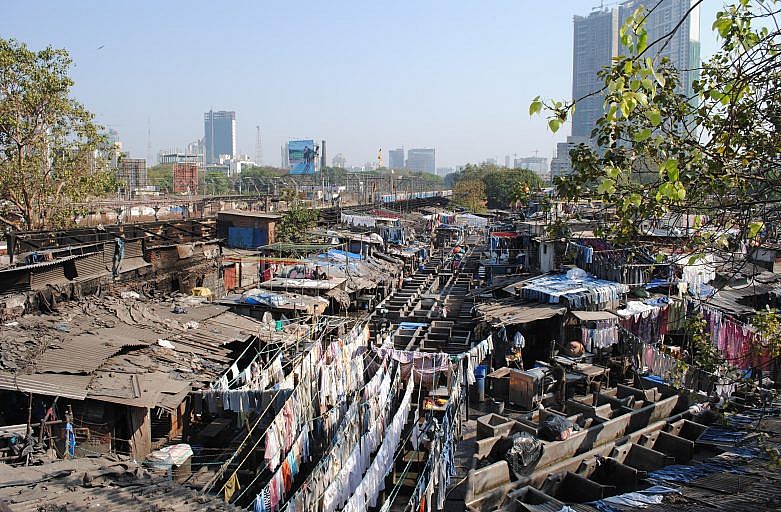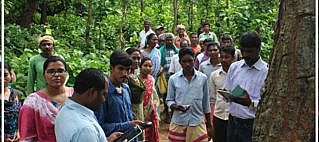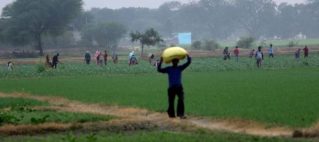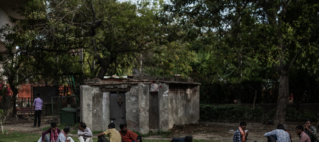“Reviving the post Covid-19 Indian Economy and the Twin Challenges of Informal Workers and Slums"
About the authors
Mr. Pranab R. Choudhury is the Founder-Coordinator of NRMC Centre for Land Governance.
Opinions are personal
This article was earlier published in LandPortal Foundation
Informal workers and desperate journeys
‘Corona lockdown’ led to one of the biggest migrations in India’s modern history. Hungry, thirsty and hapless- millions of migrant workers who form the backbone of our glittering megacities- took to the road, on desperate journeys home. These migrant workers are part of the informal economy- toiling away in construction sector and small factories, recycling waste or doing other precarious jobs. Many of them are landless or small/marginal farmers from rainfed farming areas, migrating seasonally.
Invisible in the policy discourses, these informal workers contribute almost half of the national income. Estimates put this workforce to be about 80 to 90 percent of the total. They are either self-employed or dependent on daily wages for their subsistence. Majority of them have no savings and no contracts that guarantees social security benefits. The lockdown laid bare the targeting challenges (and failure) of the hundreds of Central and State governments led social protection programmes as these migrant workers and others living in the urban slums could not benefit from them.
Informal work intersects informal settlements
For these migrant workers – ‘home’ - are their worksites or cramped, dilapidated and densely populated slums. For the migrant workers- their invisible informal work and socio-economic deprivations - manifests in the perpetuation of their life in slums. Take for instance, Dharavi, the largest slum in Mumbai, the financial capital of India, (and in Asia), where COVID-19 has triggered havoc, by some estimates, has an informal economy exceeding 1 billion USD.
Although contested, estimates are that 65 to 105 million, or almost one in every four urban Indian lives in slums. Amongst other policy failures, slums stem from the State’s inability to provide decent and affordable housing for the poor in the cities. Slums are usually not reflected in the city maps and many of these are situated on floodplains, garbage dumpsites and other hazardous environments.
In these unsanitary environments- water facilities are grossly inadequate and sometimes more than 10 people share a tiny room and 10 to 100 people share a toilet. Social distancing, handwashing and sanitation prescriptions are a luxury. Malnutrition remains a persistent concern and chronic illnesses go untreated. Given India’s dilapidated health infrastructure, the pandemic has also exacerbated the disparities in access to health for the migrant workers.
In the absence of security of tenure, the slum dwellers lack institutional right to improved water, sanitation, garbage collection and electricity services. Crowded cities with high concentration of urban poor in dense areas and systemic socio-economic inequalities are the tinderbox for infectious disease outbreaks. With more such pandemics predicted with the contemporary development trajectory, these ‘city builders’ and their slum homes deserve more attention.
Kickstarting the post Covid economy – addressing informal labour and settlements
Post-pandemic, GDP projections are being revised downward, Economists are now pinning their hopes on stimulus packages shoring up domestic production and massive public investment projects to revive the flagging economy.
Amongst sectors set to trigger revival of Indian economy are micro, small & medium enterprises (MSME), real estate, construction, textiles, travel and hospitality. Ironically these sectors employ most of the informal workers. Doubts are being raised if these traumatized and abandoned migrants will ever return to these cities. Given their immense contributions, the least these megacities can do to assuage these workers is to improve their working and living conditions.
Many cities around the world are focusing on building back better and increasing their resilience. Hundred years ago, after a similar pandemic, Europe had overhauled its housing laws and regulations, which led to halting many diseases. COVID-19 provides a similar opportunity in India to build just, equitable and sustainable cities. This is an opportunity to build the resilience of slums and slum dwellers to protect against the pandemic and address systemic and structural problems that increases their vulnerability.
For the informal workers, along with the various labour reforms to remove precarity, special focus on ‘portable’ social protection measures, ‘not tied to their place of residence’ -can be a quick policy measure. Addressing their informality and identity through secured labour card, can immediately provide them access to food and cash transfer and other social protection schemes. This would also prevent them from falling into indebtedness and losing their productive assets.
Other measures include addressing rental vulnerability, which contributed to the migrant exodus and had led Government of Delhi and India to advise the landlords for temporary rent waivers. Similar rental waivers, temporary bans on payment of public utility bills, and moratoria on slum evictions, regularization of slums, slum upgrading, provision of affordable housing and land titling programmes are other proven measures. Securing land and housing tenure, can be the first logical step; which can also trigger housing improvement and increase access to basic services and trunk infrastructure.
Around improved tenure, lessons from recent housing and property rights reforms of Central government as well as innovative approaches by states like Odisha’s
Slum dwellers’ land rights Act and Livable Habitat Mission may be useful to consider, while strategizing post-COVID-19 slum rehabilitation and resettlement strategies.




